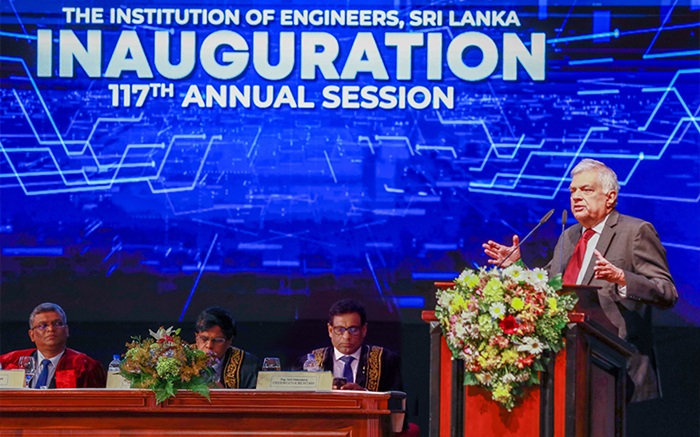
President Ranil Wickremesinghe has outlined plans for modernizing the Agriculture Ministry.
Addressing the 117th Anniversary of the Institution of Engineers, he expressed his intention to seek external assistance to design a new Agricultural Ministry by studying how similar ministries function in countries like Thailand and Malaysia.
According to the President’s Media Division (PMD), he also emphasized the need for a well-defined ministerial structure for progress.
The President also discussed the next stage of modernizing agriculture, including the utilization of previously unused land, particularly in the Mahaweli area and plantations, covering approximately 700,000 to a million acres.
Additionally, he pointed out the importance of incorporating various Agriculture Research Institutes into a single institution called the University for Agricultural Technology and engaging the private sector. This holistic approach aims to modernize agriculture, with a focus not only on education in agriculture but also on engineering.
Additionally, the President made a significant announcement about the amalgamation of the plantation industries and agriculture sectors, which were separated since 1970. He discussed the historical context of this separation and the need to modernize the agricultural sector.
President Wickremesinghe encouraged collaboration and input from the Institution of Engineers and left the door open for ongoing consultation as these plans develop and progress.
He also highlighted the pivotal role of engineering in Sri Lanka’s future development and emphasized the significant contributions of engineers to the nation, both historically and in the present, mentioning milestones such as the construction of the Kandy road and the Mahaweli program, which was completed in a remarkably short time frame.
President Wickremesinghe underscored the need for a forward-looking approach, especially in the context of debt restructuring and the pursuit of a new, sustainable economy. He identified three key areas where engineers would play a crucial role: competitiveness, digital transformation and the green economy.
Regarding competitiveness, he stressed that engineering skills are essential for Sri Lanka to become highly competitive in various fields. He highlighted the importance of engineers in building the digital economy, predicting a gradual transformation over the next decade.
Furthermore, the President discussed the potential for green hydrogen exports, which could be a unique opportunity for Sri Lanka, further emphasizing the role of engineers in this endeavour.
The President acknowledged the need for engineering technology in all these areas, noting that without it, progress would be challenging. He encouraged the growth of engineering talent to meet these future demands, suggesting that the country should double its estimates to account for engineers going abroad.
President Wickremesinghe also emphasized the importance of technical education and vocational engineering skills in addressing the shortage of human resources needed for these technological advancements. He indicated that the government would propose innovative solutions in this regard during the budget report.
In conclusion, President Wickremesinghe called on the Institution of Engineers to actively participate in these initiatives to propel Sri Lanka towards a new economy, marked by technological innovation and agricultural modernization. (NewsWire)


